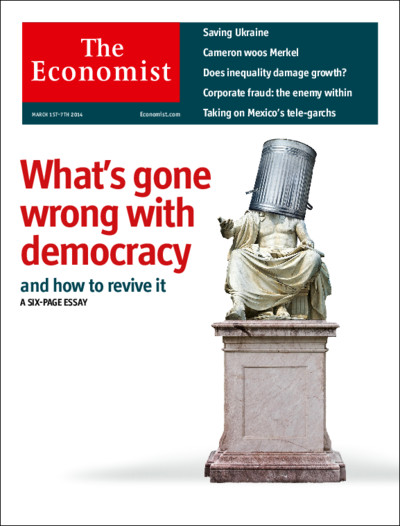Главный материал одного из номеров мартa 2014 года влиятельного британского право-либерального журнала The Economist - эссе о современном кризисе демократии.
What’s gone wrong with democracy
Democracy was the most successful political idea of the 20th century. Why has it run into trouble, and what can be done to revive it?
Само эссе:
http://www.economist.com/news/essays/21 ... -can-be-do
Обсуждение эссе на сайте The Economist:
http://www.economist.com/node/21596796/comments
Эссе в целом интересное, но самым интересным в нем является слабость его последней главы, которая называется "Getting democracy right". На мой взгляд, автор(ы) в этой главе избегают рассмотрения фундаментальных проблем демократии, вместо этого концентрируясь на всяких частичных мерах (вроде брать пример с демократии низшего уровня в Калифорнии!

), которые, якобы, демократию спасут.
Интересно упоминание в эссе как некоторых (нелестных) мыслей Платона о демократии, так и неявное присутствие платоновской концепции о путях деградации государственного устройства - от оптимального государства, где правит элита царей-философов, к аристократии, затем к тимократии, затем к олигархии, которая деградирует в демократию и, наконец, платоновский финал - деградация демократии в тиранию.
Автор(ы) эссе согласны по крайней мере с одной, указанной Платоном почти 2500 лет назад слабостью демократии: "Plato’s great worry about democracy, that citizens would “live from day to day, indulging the pleasure of the moment”, has proved prescient." Они же похоже согласны с Платоном (а также с Политбюро ЦК КПК), и по поводу того, в какую сторону нужно выбираться из демократии: "Isn’t this a recipe for weakening democracy by handing more power to the great and the good? Not necessarily." Однако, в то же время, автор(ы) похоже считают, что предсказанное Платоном скатывание к тирании не является самой большой опасностью для современной западной демократии: "... checks and balances were motivated by fear of tyranny. But today, particularly in the West, the big dangers to democracy are harder to spot."
Несколько выдержек из эссе:
Democracy is going through a difficult time. Where autocrats have been driven out of office, their opponents have mostly failed to create viable democratic regimes. Even in established democracies, flaws in the system have become worryingly visible and disillusion with politics is rife. Yet just a few years ago democracy looked as though it would dominate the world.
[...]
Why has democracy lost its forward momentum?
The two main reasons are the financial crisis of 2007-08 and the rise of China. The damage the crisis did was psychological as well as financial. It revealed fundamental weaknesses in the West’s political systems, undermining the self-confidence that had been one of their great assets.
[...]
Meanwhile, the Chinese Communist Party has broken the democratic world’s monopoly on economic progress. Larry Summers, of Harvard University, observes that when America was growing fastest, it doubled living standards roughly every 30 years. China has been doubling living standards roughly every decade for the past 30 years. The Chinese elite argue that their model—tight control by the Communist Party, coupled with a relentless effort to recruit talented people into its upper ranks—is more efficient than democracy and less susceptible to gridlock. The political leadership changes every decade or so, and there is a constant supply of fresh talent as party cadres are promoted based on their ability to hit targets. [...] In just two years China has extended pension coverage to an extra 240m rural dwellers, for example—far more than the total number of people covered by America’s public-pension system.
[...]
Yet in recent years the very institutions that are meant to provide models for new democracies have come to seem outdated and dysfunctional in established ones. The United States has become a byword for gridlock, so obsessed with partisan point-scoring that it has come to the verge of defaulting on its debts twice in the past two years. Its democracy is also corrupted by gerrymandering, the practice of drawing constituency boundaries to entrench the power of incumbents. This encourages extremism, because politicians have to appeal only to the party faithful, and in effect disenfranchises large numbers of voters. And money talks louder than ever in American politics.
[...]
The biggest challenge to democracy, however, comes neither from above nor below but from within—from the voters themselves. Plato’s great worry about democracy, that citizens would “live from day to day, indulging the pleasure of the moment”, has proved prescient.
[...]
At the same time, democracies in the emerging world have encountered the same problems as those in the rich world. They too have overindulged in short-term spending rather than long-term investment. Brazil allows public-sector workers to retire at 53 but has done little to create a modern airport system. India pays off vast numbers of client groups but invests too little in infrastructure. Political systems have been captured by interest groups and undermined by anti-democratic habits. Patrick French, a British historian, notes that every member of India’s lower house under the age of 30 is a member of a political dynasty. Even within the capitalist elite, support for democracy is fraying: Indian business moguls constantly complain that India’s chaotic democracy produces rotten infrastructure while China’s authoritarian system produces highways, gleaming airports and high-speed trains.
[...]
Getting democracy right
[...]
Foreign leaders should be more willing to speak out when rulers engage in [...] illiberal behaviour, even if a majority supports it. But the people who most need to learn this lesson are the architects of new democracies: they must recognise that robust checks and balances are just as vital to the establishment of a healthy democracy as the right to vote.
[...]
Even those lucky enough to live in mature democracies need to pay close attention to the architecture of their political systems. The combination of globalisation and the digital revolution has made some of democracy’s most cherished institutions look outdated. Established democracies need to update their own political systems both to address the problems they face at home, and to revitalise democracy’s image abroad.
